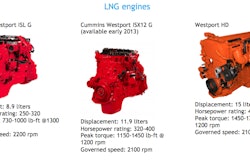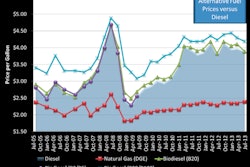A federal court on Friday dismissed a challenge from three of the world’s largest heavy truck makers aimed at voiding emissions compliance certificates granted to Navistar from the U.S. Environmental Protection Agency.
The “certificates of conformity” allowed Navistar to make and sell non-complaint model engines while being assessed a fine on each one sold.
The decision by a three-judge panel for the U.S. Court of Appeals in Washington, D.C., involved a case brought by Daimler Trucks North America – and later joined by Mack Truck and Volvo Trucks North America – originally asked a lower court to revoke certificates issued by the EPA when Navistar’s EGR engines failed to meet federal clean air regulations.
Daimler says Navistar benefited from the certificates at the expense its competitors, who pumped millions of dollars into the research, development and engineering of SCR engines that met tightening emissions standards while Navistar was allowed to sell non-compliant engines and assessed a penalty of $1,919 per truck.
The plaintiffs say voiding the certificates would open Navistar up to potential fines and lawsuits, which would divest the company of any financial gains obtained from selling non-complaint engines.
“Daimler’s rationale fails to persuade us,” Circuit Judge Karen Henderson wrote in her opinion. “Even assuming…penalties awarded to the United States Treasury could qualify as redress to Daimler, the prospect of such relief in an EPA enforcement action or citizen suit by Daimler is unduly speculative. Second, regarding Daimler’s possible pursuit of a citizen suit, the likelihood of monetary penalties is likewise speculative.”
Henderson further notes that if there was any perceived improper use of the credits, it was more the fault of the EPA than it was Navistar.
“Here, to the extent Navistar could be found to have violated the CAA by operating under certificates that subsequently were found to have been issued improperly by EPA, Navistar acted in good faith reliance on the validity of the certificates, EPA’s brief acknowledges that it considers Navistar to have acted in good faith, the violation stemmed from the agency’s failure to follow its own procedural requirements and any violation took place for a limited time before issuance of the Final Rule,” she wrote.
Henderson continues that the certificates became invalid after the completion of model year 2012 engine manufacturing, anyway.
“With the expiration at the end of the 2012 model year, the certificates ceased to have any effect whatsoever,” and they “can no longer profit Navistar or injure Daimler.”










